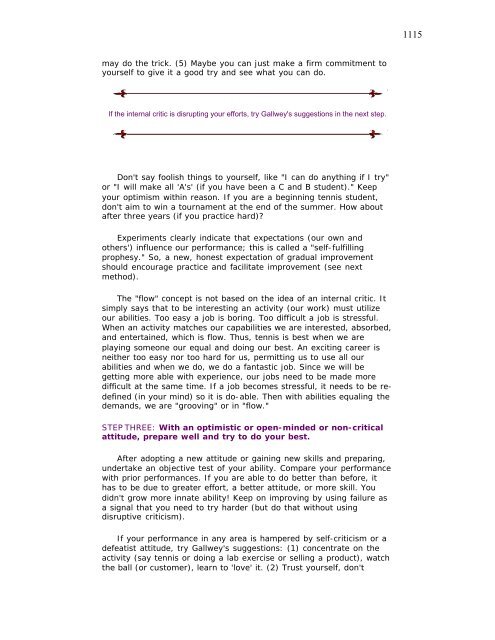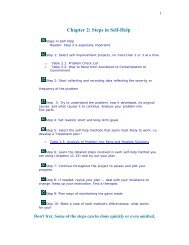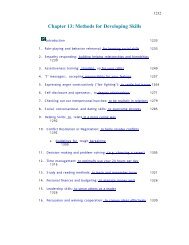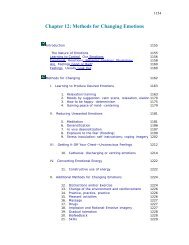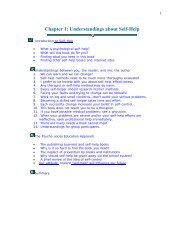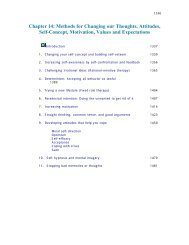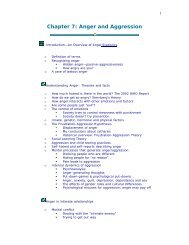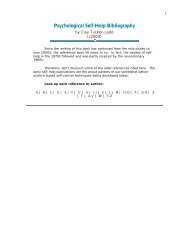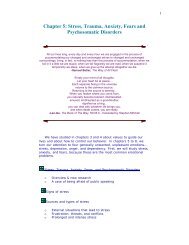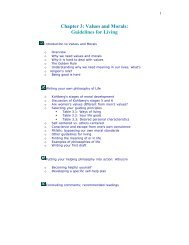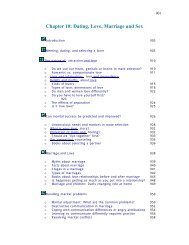Methods for Changing Behaviors - Psychological Self-Help
Methods for Changing Behaviors - Psychological Self-Help
Methods for Changing Behaviors - Psychological Self-Help
Create successful ePaper yourself
Turn your PDF publications into a flip-book with our unique Google optimized e-Paper software.
may do the trick. (5) Maybe you can just make a firm commitment to<br />
yourself to give it a good try and see what you can do.<br />
If the internal critic is disrupting your ef<strong>for</strong>ts, try Gallwey's suggestions in the next step.<br />
Don't say foolish things to yourself, like "I can do anything if I try"<br />
or "I will make all 'A's' (if you have been a C and B student)." Keep<br />
your optimism within reason. If you are a beginning tennis student,<br />
don't aim to win a tournament at the end of the summer. How about<br />
after three years (if you practice hard)?<br />
Experiments clearly indicate that expectations (our own and<br />
others') influence our per<strong>for</strong>mance; this is called a "self-fulfilling<br />
prophesy." So, a new, honest expectation of gradual improvement<br />
should encourage practice and facilitate improvement (see next<br />
method).<br />
The "flow" concept is not based on the idea of an internal critic. It<br />
simply says that to be interesting an activity (our work) must utilize<br />
our abilities. Too easy a job is boring. Too difficult a job is stressful.<br />
When an activity matches our capabilities we are interested, absorbed,<br />
and entertained, which is flow. Thus, tennis is best when we are<br />
playing someone our equal and doing our best. An exciting career is<br />
neither too easy nor too hard <strong>for</strong> us, permitting us to use all our<br />
abilities and when we do, we do a fantastic job. Since we will be<br />
getting more able with experience, our jobs need to be made more<br />
difficult at the same time. If a job becomes stressful, it needs to be redefined<br />
(in your mind) so it is do-able. Then with abilities equaling the<br />
demands, we are "grooving" or in "flow."<br />
STEP THREE: With an optimistic or open-minded or non-critical<br />
attitude, prepare well and try to do your best.<br />
After adopting a new attitude or gaining new skills and preparing,<br />
undertake an objective test of your ability. Compare your per<strong>for</strong>mance<br />
with prior per<strong>for</strong>mances. If you are able to do better than be<strong>for</strong>e, it<br />
has to be due to greater ef<strong>for</strong>t, a better attitude, or more skill. You<br />
didn't grow more innate ability! Keep on improving by using failure as<br />
a signal that you need to try harder (but do that without using<br />
disruptive criticism).<br />
If your per<strong>for</strong>mance in any area is hampered by self-criticism or a<br />
defeatist attitude, try Gallwey's suggestions: (1) concentrate on the<br />
activity (say tennis or doing a lab exercise or selling a product), watch<br />
the ball (or customer), learn to 'love' it. (2) Trust yourself, don't<br />
1115


